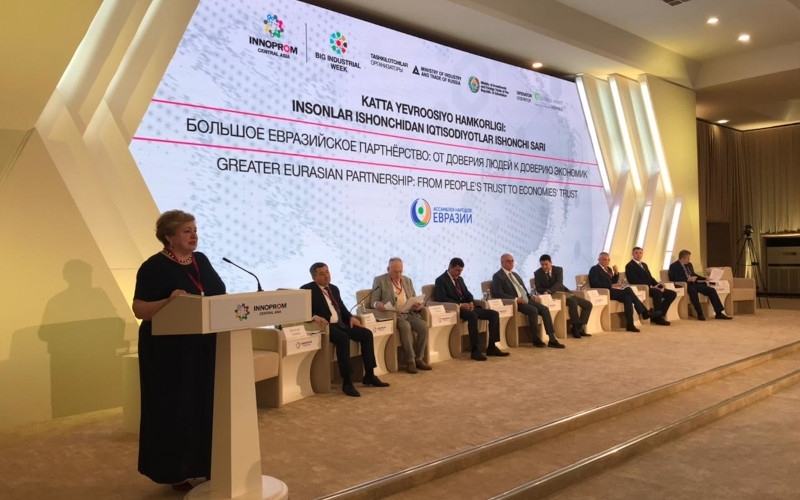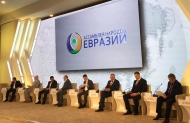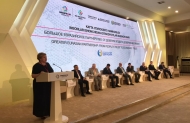
On April 26, the Eurasian Peoples’ Assembly held a panel discussion "The Great Eurasian Partnership: from people's trust to the trust of economies" at the Central Asian International Industrial Exhibition INNOPROM.
Today, integration processes largely determine the current context for the development of the world economy.
The large territory of Eurasia, in order to facilitate logistics, trade and other economic processes, requires the creation of maximally unified regulatory systems for all spheres of economic activity, common digital and logistics platforms.
INNOPROM-2022 has chosen the identification of new vectors for the development of cooperation and strengthening business contacts between partners of the Central Asian countries as a priority.
How to make Greater Eurasia a space of cooperation and trust? Are the national and multilateral development institutions of Greater Eurasia capable of overcoming attempts at economic isolation and helping to form a common space for joint harmonious growth? What infrastructure, industrial and trade projects require the expertise and resources of the development institutions of the EAEU, SCO and other integration associations? Is it possible to combine such initiatives in the interests of the entire continent?
These and many other topical issues were put on the agenda of the panel session "The Greater Eurasian Partnership: from People's Trust to the Trust of Economies".
The panel session was attended by Deputy Minister of Foreign Affairs of the Republic of Uzbekistan Furkat Sidikov.
The main presentations at the international platform of the Eurasian Peoples’ Assembly within the Central Asian International Industrial Exhibition "INNOPROM" were made by:
- Zhakhongir Aminov, Head of the Department for Cooperation with CIS Countries of the Main Department of Bilateral Cooperation of the Ministry of Foreign Affairs of the Republic of Uzbekistan (Uzbekistan);
- Sergey Glazyev, Member of the Board (Minister) for Integration and Macroeconomics of the Eurasian Economic Commission, member of the Supreme Advisory Council of the Eurasian Peoples’ Assembly (Russia);
- Dmitry Volvach, Deputy Minister of Economic Development of the Russian Federation (Russia);
- Jamshid Sharipov, representative of the Non-governmental non-profit organization "Development Strategy Center" (Uzbekistan);
- Vladimir Yakunin, Head of the Department of Public Policy, Faculty of Political Science, Lomonosov Moscow State University; Member of the Supreme Advisory Council of the Eurasian Peoples’ Assembly (Russia);
- Kabuljon Sabirov, Director of the SCO People's Diplomacy Center in Uzbekistan (Uzbekistan);
- Marco Riccieri, Secretary General of the EURISPES Institute of Economic, Social and Political Studies (Italy);
- Gennady Bessonov, Secretary General of the International Coordinating Council for Trans-Eurasian Transport (CCT) (Russia);
- Valery Ruzin, President of the Eurasian Academy of Television and Radio, Deputy Secretary General of the Eurasian Peoples’ Assembly (Russia);
- Alexey Bondaruk, Deputy Head of the Department of Foreign Economic and International Relations of the City of Moscow (Russia).
The platform was moderated by First Deputy Secretary General – Head of the General Secretariat of the Eurasian Peoples’ Assembly Svetlana Smirnova and Deputy Secretary General of the Eurasian Peoples’ Assembly Stanislav Korolev.
In its activities, the Eurasian Peoples’ Assembly implements diverse projects aimed at strengthening integration processes through diverse cooperation with partners from different countries.
The Assembly has concluded more than 140 cooperation agreements with business organizations, chambers of commerce, higher education institutions, foundations, research centers, various public organizations and associations from India, France, Serbia, Greece, Syria, Kazakhstan, Kyrgyzstan, Tajikistan, Uzbekistan, Turkey, Bulgaria, Russia, Azerbaijan, England, Italy, Spain, Benin and other countries.
The joint search for new solutions and the development of strategies, the strengthening and development of mutual contacts, undoubtedly contribute to the formation of a common atmosphere of trust.
The economy of trust is a dialogue, it is a partnership.
Summing up, most of the participants of the panel discussion noted in their speeches that successful economic projects are born out of people's personal trust. It is trust that lays the best foundation for strategic economic integration.








